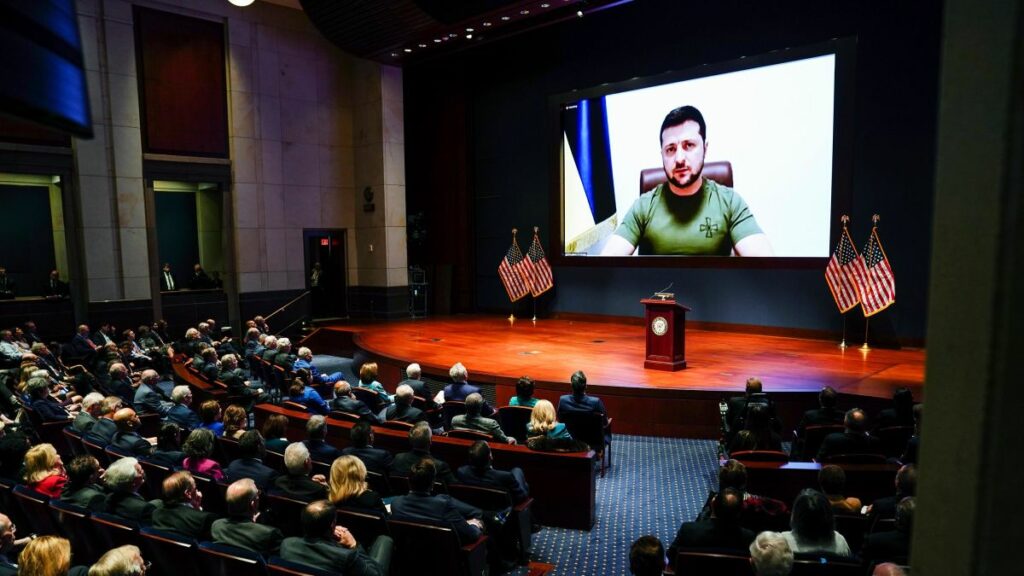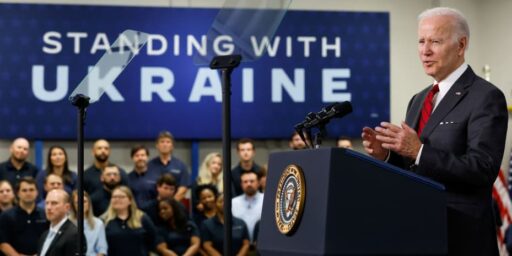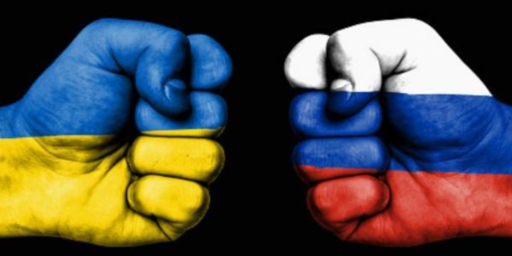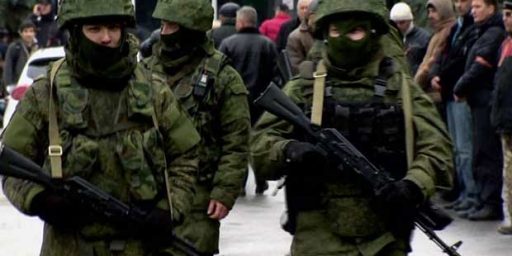The Good Guys Do Propaganda, Too
Ukraine is heavily censoring foreign media.

Semafor’s Ben Smith takes us “Inside the high-stakes clash for control of Ukraine’s story.”
Journalists covering the Russian invasion of Ukraine are engaged in a running, low-grade conflict with the Ukrainian government, which many believe uses access and accreditation to shape their stories.
Articles and broadcasts from outlets including NBC News, The New York Times, CNN, The New Yorker, and the Ukrainian digital broadcaster Hromadske have led to journalists having their credentials threatened, revoked, or denied over charges they’ve broken rules imposed by Ukrainian minders.
The largely unreported conflict spilled briefly into public in late May when the well-known Ukrainian photographer Maxim Dondyuk complained on Instagram that the military press office was threatening to revoke his accreditation after his haunting images appeared in a New Yorker article portraying the trench life of Ukrainian draftees on the front line..
“The authorities only allow press tours with press officers, where they show off in front of the camera and are afraid to show the real situation,” Dondyuk wrote in furious posts to Instagram, which he subsequently deleted, adding that Ukrainian authorities were threatening to strip his accreditation. “Are you ready to read only stupid propaganda?”
The New Yorker blowup is the latest in a running series of conflicts between the media covering the war and the Ukrainian authorities, which have had to ramp up a massive press operation as they fight for their country’s life against an invader four times their size. Their military press office vets journalists and issues passes which allow them to travel to certain areas, often with press handlers, and to interview officials, after signing a document stating that journalists will abide by rules outlined by the military.
One particular target of official Ukrainian ire has been the New York Times reporter Thomas Gibbons-Neff, a former U.S. Marine who covers the Ukrainian military closely, and who drew particular anger when he reported that the Ukrainians were using banned cluster munitions. He has had his credentials revoked and his renewal denied in separate incidents, a Times spokesperson said, though they were ultimately re-issued.
Another tense incident began this February, when an NBC News crew rode the train from Moscow to Crimea.
“This is our land,” a pro-Russian resident of Sevastopol told correspondent Keir Simmons for the February 28 broadcast. And her words “echoed those of most people NBC News spoke to in Crimea this week,” the network reported. The segment, conducted amid the Russian occupation, was a rare public relations coup for the Russian side.
In response to the broadcast, the Ukrainian government revoked NBC’s credentials, effectively confining their local team to a Kyiv hotel.
The Crimea visit was “a violation of Ukrainian legislation and we don’t want other Western media companies doing the same,” a foreign ministry spokesman, Oleg Nikolenko, told me Friday.
This strikes me as incredibly short-sighted but it’s not really surprising. The Ukrainian government naturally wants to present the best possible picture of their war effort. They’re trying to sustain morale among the troops, hope on the home front, and support from the West.
Even the United States government tries to limit press access during wartime, doing its best to stage-manage what reporters can see and how they present their coverage. And Ukraine doesn’t have anything like our culture of free expression.
The heated clashes have remained largely behind the scenes because the credentials are vital to report from the country, and journalists worry that a public conflict might further threaten their access. Most of the journalists from Western and Ukrainian news organizations who have clashed with their handlers spoke on the condition of anonymity.
One told me bluntly he didn’t want to be quoted in this story because “there’s very little upside and some chance that they might snatch my press credential.”
Ukrainian journalists face more intense pressure than foreign correspondents to present an optimistic view of a conflict their friends and family are dying in, noted Nastya Stanko, a correspondent for Hromadske. She was among a number of journalists, including from CNN, who had their credentials temporarily suspended after broadcasting from Kherson after the Ukrainian government had retaken it but before they had permission.
“It’s more important to have journalists who can honestly show what happens on the front lines, and I’m not sure it’s clear to everyone in the army,” she said.
Again, that’s not even the view of the American armed forces. In World War II, American reporters wore Army uniforms. In Vietnam, they were independent but widely seen by the brass as effectively supporting the enemy. Starting with the Gulf War, we have gone back to the practice of embedding journalists with units—ostensibly to ensure their protection but absolutely with the intention of building rapport and the sense that we’re all on the same team.
Smith seems to agree:
Information has always been a weapon of war, and the government of Volodymyr Zelenskyy has been virtuosic at telling the country’s story. The Western media’s skirmishes with Ukrainian handlers reflect the underlying reality that most Western news outlets treat Ukrainian soldiers as, at some level, “our boys.” The fights over access are familiar to U.S. reporters from American wars. And Ukraine’s restrictions do not approach those imposed on the US press in the 20th Century by its own government; the Ohio State historian Christopher Nichols noted in an interview: During the First World War, almost 100 US journalists lost “‘mailing privileges” when censors ruled they were undermining the war effort.
The journalistic tensions do reflect a deeper friction: American, French, or British journalists write for publics who are largely sympathetic to Ukraine — but whose interests aren’t identical. The subjects most likely to draw ire from Kyiv include morale, casualties, and the role of fighters with far right ties in the war effort, a favorite Russian propaganda topic.
Crimea is also high on the list. Ukrainian officials have promised to liberate the occupied territory. But they may face pressure from the West for a settlement that would leave Crimea in Russian hands.
Truth may not exactly have been the first casualty in a war that has been broadcast on social media with unprecedented clarity. But the behind-the-scenes fight for access shapes some of what Western readers see and read.
Precisely because most of us are supportive of the Ukrainian cause, we naturally take Ukrainian propaganda at face value while discounting everything that seems to be from the Russian perspective. We should obviously be more skeptical of any wartime reporting. Even absent active censorship, it’s simply hard to see the whole picture from any vantage point open to reporters.






We had journalists embedded in the more recent wars but we still heavily censor, officially or unofficially, photographs. Things are very much sanitized. We see pictures of super accurate bombs hitting targets from 10,000 feet but rarely blown up bodies. I think it makes it easier to be more supportive of war in general if it looks like video games and you arent really seeing the effects other than some destroyed buildings.
Steve
@steve:
There’s been much complaining in the news media about access to war coverage since Gulf War I in the early 90s.
I recall portions of a editorial by Walter Cronkite at the time, comparing the pool reporting to the access the media were given in Vietnam. Of course, there’s a widespread feeling coverage in Vietnam contributed to the erosion of support at home.
Thinking of the title, is it possible that instead of thinking in terms of “good guys” and “bad guys” we shift to a perception of a contest between people who are doing whatever they need to survive and other people who are trying to kill them? I’m not making the argument that Zelensky is a bad guy here, either. But, he has the right to take whatever actions are necessary to maintain the possibility that his country will survive this war, and that condition would be the same even if he turns out not to be a “good guy.”
@Just nutha ignint cracker: I absolutely agree that, because they’re the aggrieved party, they have more latitude in pushing the envelope on the rules. Hell, as Smith points out, the USA routinely violated the basic rights of its citizens in past wars.
Not very surprising.
UK has certainly always taken the view that information management is a part of warfare.
Though also, as part of that, it’s best to be honest (if not open) most of the time.
Helps to lie when necessary if you don’t when it’s not.
Hence the reputation of the BBC for being truthful during WW2, whereas the German propaganda became a laughing stock.
Part of Ukraine’s problem with open reporting is that the history of some of it’s nationalist movements is problematic, from the view of those unfamiliar with the history of the region. It’s hardly surprising that after Soviet re-conquest in 1918/21 and the Holomodor, a lot of Ukrainians saw the Germans as liberators, and that some after the Soviet Union 1944/91 reverted to that.
Reflex of “whatever Soviets/Russian are against, I’m for it.”
Other people in similar positions have made similar calculations/mistakes: see Sukarno and Subhas Chandra Bose re. collaboration with Imperial Japan. And Bose is still revered by a lot of Indian nationalists.
Or IRA cooperation with the Nazis.
The “my enemy’s enemy…” doctrine can end up in unpleasant places, sometimes.
After all, the UK and US ended up allied to the Soviet Union that the UK at least had considered declaring war upon in 1939/40.
When Churchill said “If Hitler invaded Hell, I would make at least a favourable reference of the Devil in the House of Commons.” it was not entirely a joke; or at least, a bitterly ironic one.
@JohnSF:
Lies about war have to be kept plausible, too. Although it’s amazing what some people will believe.
In particular I’m thinking of Gulf War II. Baghdad Bob (not his real name, probably), made claims about the results of engagements with US troops that were not only false, but ridiculous in light of the experiences in Gulf War I.
And yet, many who sympathized with Iraq and/or Hussein, were shocked when US troops entered Baghdad and methodically took over.
The biggest lie in the Ukraine war thus far is Putin’s, when he claimed everything had proceeded “to plan.”
If the plan involved invading along all of Ukraine’s land borders with Russia and Belarus and making a drive straight to Kyiv, only to pull back in the north and center and instead advance on the south mostly along the coast, then it was the stupidest plan ever devised. Like Benito level planning, and that on a bad day.
@JohnSF:
Assisting the ethnic cleansing was hardly limited to Ukraine too. Significant fractions of the populations in Lithuania, Poland, et al eagerly chipped in on the effort to cleanse themselves of those commie (Jews). Hitler did a remarkable job of conflating “jew” with “communist” in the minds of a great many people. There were German divisions formed of French, Danish, Belgians, you name it. Eager to go get those nasty commies (Jews). In fairness they would not have had near the turnout if the death camps had been envisioned. Such is the way of the worst evil, hard to imagine.
I suspect it was a rabid fear of communism that scotched Litvinov’s proposal to the UK to form an alliance to check Hitler though. What do you think?
Two topics here: the sociology of Semitisms in Europe; and the impact of anti-communism on international relations.
To take the second:
A lot of Europeans loathed the Bolshevik regime. And not just right-wingers either; that’s a bit of a myth. Even the Marxists (that is, communists!) of the German SPD disliked the Bolshevik Communists almost as much as they did the Nazis. The view of much of the Labour Party on Bolsheviks were unprintable.
Lenin said “we should support Henderson (the Labour Party leader) as the rope supports a hanged man.” and the sentiment was repaid with interest.
It should not be forgotten: at this point the worst Nazi atrocities lay in the future, though they were already plainly abhorrent. But the Bolsheviks had already been responsible for the deaths of millions.
In addition, in 1919/21 many Bolsheviks believed that Soviet Russia could and must carry revolution into western Europe, and ignite the proletarian revolt they saw as necessary to the survival of Communism. Like a lot of non-Bolshevik Marxists, they viewed relatively backward and agrarian Russia as a poor basis for a secure socialist state.
In pursuit of this gaol they invaded Poland in 1919, were driven back in early 1920, mounted a major offensive in Summer 1920, and were stopped at the Battle of Warsaw aka “the Miracle of the Vistula” in August 1920 by the Polish Army supported by French artillery.
After that experience, the Poles, and the Czechs, were very dubious about Soviet proposals for alliance.
The Western Allies problem was that after the searing experience of WW1 they were fearful and divided, internally and between each other. So they missed the opportunity to crush Germany by war in 1938, before the Soviet Union became a crucial factor in the balance.
@Kathy:
A little-known piece of trivial is that Baghdad Bob wasn’t actually lying – at least to the extent that made him a laughing stock. The reality is that the regime believed the US hadn’t advanced that far for several reasons:
– We had gotten so far in their OODA loop that we advanced faster than their hierarchical communications could process
– As a despotic regime, few were willing to give the leadership bad news, so Saddam’s inner circle was highly insulated from certain realities. (His own children regularly lied to him)
– We were very effective at destroying Iraq’s communications and command-and-control systems. The field military headquarters often couldn’t report up the chain because they were dead, or comms were down.
The regime only realized the truth when the first thunder run rolled into Baghdad.
@dazedandconfused:
Hi dazed, replied above, but forgot to tag you.
The other bit of it is on why anti-semitism was so common among the peasantry of eastern Europe, and especially the former Russian empire lands.
I don’t think it had much to do with anti-communist sentiments, though they were also real enough, and the Germans certainly tried to play them up. But the basis was earlier than that.
Old style Christian anti-semitism was also a part.
But the main thing was that across the Pale of Settlement Russian (and Polish) aristocratic landlord frequently employed Jews as rent collectors and land agents; they also very often (and sometimes the same persons) operated as shopkeepers, grain merchants and moneylenders.
It was all too easy for peasants bitterly disappointed in the outcomes of emancipation in 1861 to see Jews along with landlords as one of the prime sources of their woes.
This was one of the major causes for the ongoing incidence of rural anti-semitic pogroms.
Of course, this isn’t the whole story; and completely leaves to one side the ascendancy of Nazi antisemitism in Germany. Which ironically had formerly been seen by many Jews as a far less hostile place then the Russian Empire.